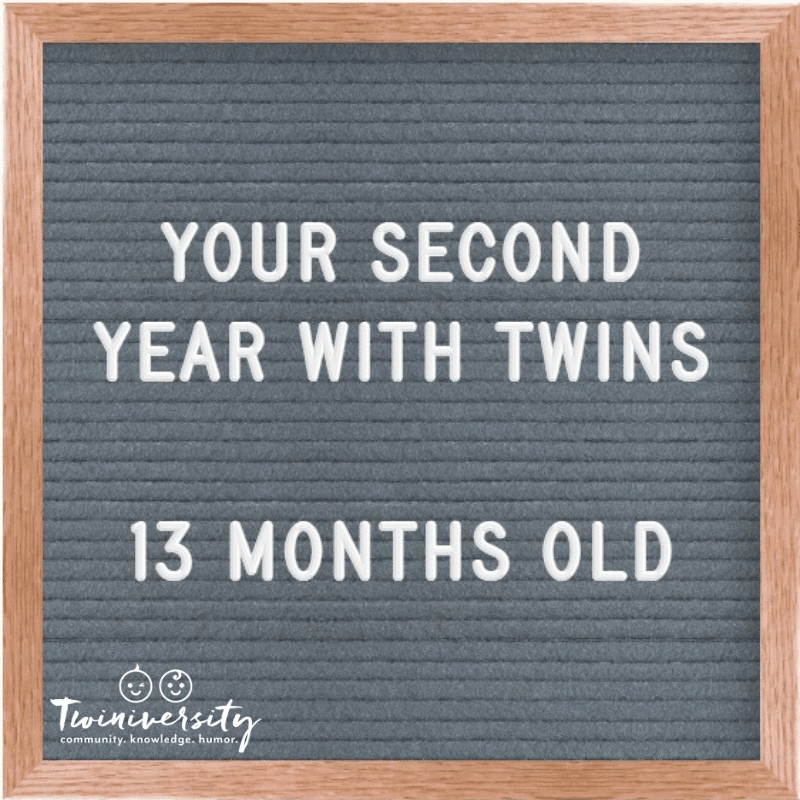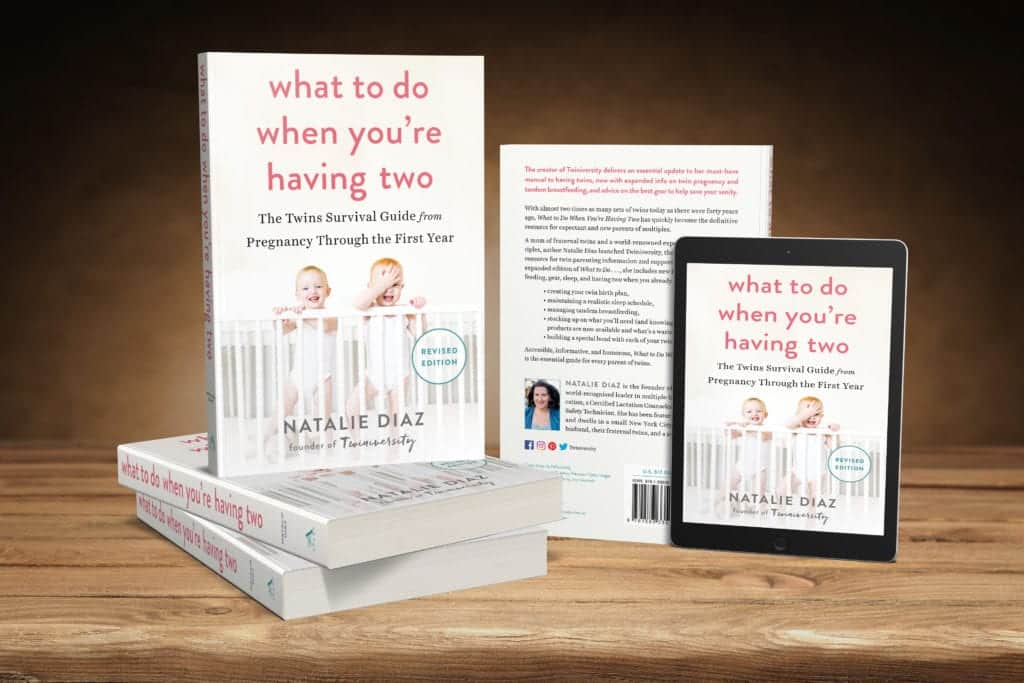Last updated on March 6th, 2024 at 10:41 am
Learn what to expect with your infant twins 13 months old, including tips, tricks, and advice from real twin parents who have been there.
All content on this website, including medical opinion and any other health-related information, is for informational purposes only and should not be considered to be a specific diagnosis or treatment plan for any individual situation. Use of this site and the information contained herein does not create a doctor-patient relationship. Always seek the direct advice of your own doctor in connection with any questions or issues you may have regarding your own health or the health of others.
Your Twins 13 Months Old
Welcome back returning twin parents! Hello and welcome to the new twin parents who are just finding us today!
You made it through your first 12 months as a twin parent and you’re now heading into your 13th month of twin parenthood. What a huge accomplishment! Little known secret: we knew you could do it!
Now what? Well, this is a good place to start. We have plenty of information and resources to help you navigate twin parenting with your twins 13 months old.
Our twin parenting tips come from our very own experienced twin parents from around the world! These parents have all been there, done that, and are ready to share their tips and tricks with you.
This second year is full of excitement, questions, and even some anxiety. Not to worry, we’ve got your back. We’ve laid out all our best tips, tricks, and advice for twins 13 months old.
Got preemies? Make sure to consider your premature twins’ corrected age when reviewing whether or not they are meeting their milestones at appropriate times. In the vast majority of cases, preemies catch up by school-age and go on to succeed at the same level as their peers. Learn more about preemie developmental milestones here

What to Expect with Twins 13 Months Old
- By now, your twins might cruise or even walk, or it may be a little longer before they take those first steps. Tots typically graduate from cruising to walking sometime around month 14, but some wait until month 15 or later.
- Don’t worry too much about klutziness — i.e. frequent falls and lots of bumping into things — as your child’s depth perception (and plain old coordination) are still a work in progress.
- A 13-month-old baby should generally sleep for about 11 to 14 hours a day. Achieving two hours of sleep during the daytime is tricky as babies delay sleep time for as long as they can on these milestones. A good sleep schedule is observed by making your child’s bedroom comfy and not letting the baby sleep in your bed in the middle of the night.
- Thirteen-month-old babies experience sleep regression caused by the active dreams they have, which wake them suddenly. Teething can also cause enough discomfort to wake your baby.
- Most toddlers at this age will also be able to drink from a cup (hello, cow’s milk), say at least one or two recognizable words, and point to what they want. Intellectually, it’s all about cause and effect now: “If I drop my spoon, someone will pick it up … again and again and again.”
- Your little ones may also imitate you like a pro — you touch your nose, they’ll touch theirs. Less adorably so, diaper changes may become a battle of wills as your little one may have a hard time staying still. Besides, he may prefer to be bare-bottomed anyway!
- On the emotional front, expect some first attempts at friendship as well as a wide range of moods and behavior, from affection and kindness to frustration and full-blown stubbornness.
- If you haven’t already, look into joining a local moms of multiples club (aka twin club). Read about local twin clubs here or join our Twiniversity monthly twin club on Zoom by signing up for a Twiniversity Membership.
Want to be the first to know about giveaways, deals, and more just for twin parents? Sign up for the Twiniversity email list! Subscribe today to get emails about giveaways, events, weekly article roundups, and more! Pregnant with twins? We’ll be sending you a weekly twin pregnancy email to keep you on track with your pregnancy to-do list! Click here to learn more… and while you’re at it, check out our Complete Baby Safety Course and Twin Parent Memberships.
Common Concerns From the Moms Who Have Been There With Twins 13 Months Old
- What can I do to encourage my twins to share?
- How delayed is too delayed when it comes to twins and language?
- How can we cut costs with twins?
- How do I deal with double tantrums?
- When should I worry if they aren’t walking yet?
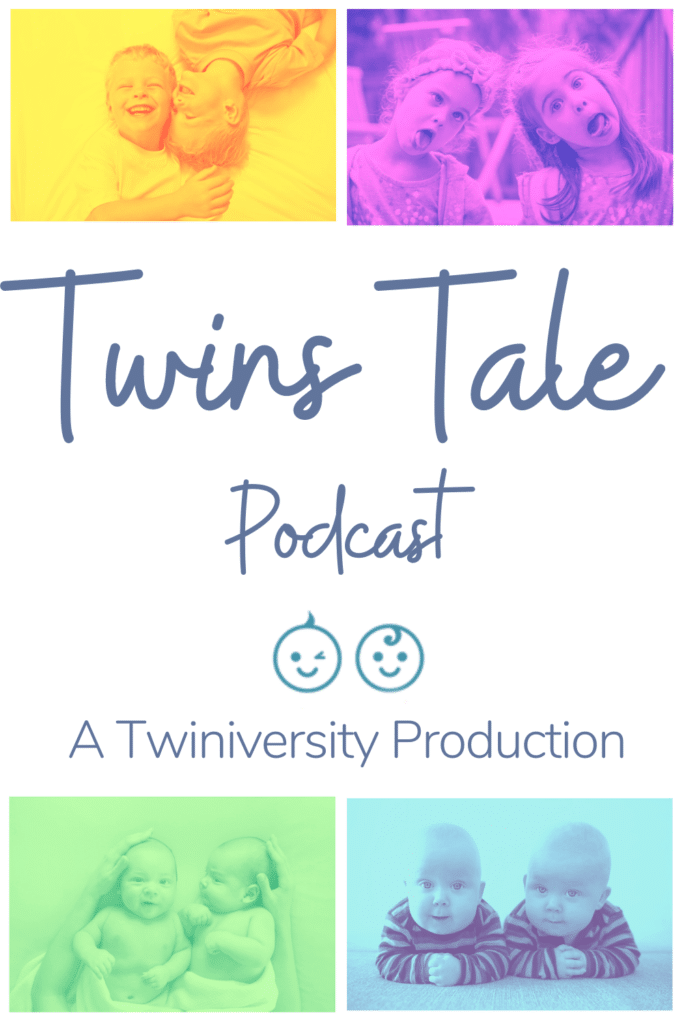
The Twins Tale Podcast by Twiniversity is an intimate look into the lives of twin parents and their twins at all ages and stages, from birth through college. We interview twin parents in the trenches and ask all the burning questions you want to know about raising twins: schedules that work, feeding your twins, getting out of the house, finding sanity, and so much more. Subscribe for FREE today!
Milestones & Developmental Leaps Parents Have Noticed With Twins 13 Months Old
What’s going on with development in twins 13 months old?
- Thirteen-month-old babies experience sleep regression caused by the active dreams they have, which wake them suddenly. Teething can also cause enough discomfort to wake your baby.
- Some food ideas for a 13-month-old baby include vegetables, fortified cereals, dried peaches, ground beef, prunes, whole wheat pasta, refried beans, and tofu.
- Most toddlers need to drink about 2 to 3 cups (roughly 16 to 24 ounces) or less per day of whole milk and 1 to 4 cups of water daily. Limit juice to no more than ½ cup (4 ounces) a day.
- Toddlers need about 11 to 14 hours of sleep a day, including naps. At this age, most take two daily naps that should generally last around one to two hours each.
- Your little one may also imitate you like a pro — you touch your nose, he’ll touch his.
- Diaper changes may become a battle of wills as your little one may have a hard time staying still. Besides, he may prefer to be bare-bottomed anyway!
- Expect some first attempts at friendship as well as a wide range of moods and behavior, from affection and kindness to frustration and full-blown stubbornness.
- By now, you may have weaned your child from the bottle if he takes one, or be in the process of phasing it out.
- It is usual for your child to poop once a day, while some may go three times and day and others even more times. The number of times your child requires to empty their bowels decreases as they continue to grow.
Inform your doctor if your child:
- Doesn’t crawl
- Can’t stand when supportive
- Doesn’t search for things you hide
- Doesn’t point at things
- Doesn’t learn gestures like waiting or shaking head
- Loses skills they once had
- Doesn’t say single words like “mama or “dada”

Challenges You Might Experience With Twins 13 Months Old
There are some challenges to look out for with twins 13 months old
- Parents say that they are dealing with twins who get into everything, now that they are mobile. Learn about keeping your babies safe here
- Are your twins biting? This is a common complaint around this time. Read more about how to deal with biting here
- Many twins struggle with the transition from formula to milk. Read what some twins parents had to say about making the switch
- Some twin parents say naps become more difficult for their babies at about 1 year. Read more on nap schedules for 1 year here
- This is often around the time that your twins may begin fighting over toys and even you! Learn how to encourage your twins to sharing here
Tips from Parents of Twins 13 Months Old
Take some tips from experienced twin parents!
- Always fit your toddler’s shoes while he’s standing up, not sitting down.
- Stick with (or start) the Bedtime Routine!
- Prepare for them to fight. A lot.
- Don’t compare your twins to other mom’s singletons
- Take more pictures than you think you should. They will LOVE to look at them with you soon!

Got twins? Us too! The Twiniversity Podcast with Natalie Diaz was created BY parents of twins FOR parents of twins, from your pregnancy days through your twin’s teenage years, this podcast covers it all. It’s all about parenting twins, offering plenty of strategies for making life better, parenting hacks, and, of course, humor. We are laughing WITH you every step of the way.
Feeding and Nap Schedule for Twins 13 Months Old
You’re really going to want a schedule for your twins! Be adaptable, but try to be as consistent as you can. Here is a suggested feeding and nap schedule for twins 13 months old. You will notice that milk is primarily given in addition to a meal, not used as a meal itself now.
- 7:00 – Wake up time! Breakfast and Milk
- 8:00 – Free playtime
- 9:00 – Snack
- 10:00 – Nap (at least 1 hour)
- 12:00 – Lunch and Milk
- 12:00 – Free playtime
- 2:00 – Nap (at least 1 hour)
- 3:00 – Snack
- 4:00 – Free playtime
- 5:00 – Dinner and Milk
- 5:30 – Bath time
- 6:00 – Book time & Milk
- 7:00 – Bedtime
Do the best you can every day to keep them on the same feeding and sleeping schedule. When you get off track try again for the next feeding or nap.
Do everything in your power to feed your twins together to make sure you get breaks. If they are on opposite feeding schedules, you will never get a break — and you deserve one!
Are You a New Twin Parent?
Check out Natalie Diaz’s book:
“What To Do When You’re Having Two
The Twin Survival Guide From Pregnancy Through the First Year”
In What to Do When You’re Having Two: The Twins Survival Guide from Pregnancy Through the First Year, national twins guru and founder of Twiniversity (and twin mom herself!) Natalie Diaz provides a no-holds-barred resource about life with twins, from pregnancy and birth all the way through your duo’s first year of life.
Accessible and informative, What to Do When You’re Having Two
is the must-have manual for all parents of twins.
When to Call the Doctor
It’s better to overreact 100% of the time than to underreact once.
Natalie Diaz, Twiniversity Founder and Mom of Twins
All content on this website, including medical opinion and any other health-related information, is for informational purposes only and should not be considered to be a specific diagnosis or treatment plan for any individual situation. Use of this site and the information contained herein does not create a doctor-patient relationship. Always seek the direct advice of your own doctor in connection with any questions or issues you may have regarding your own health or the health of others.
When it comes to calling your doctor or seeking medical advice, you have to learn to trust yourself. If you feel something isn’t right, it probably isn’t when it comes to your twins. When in doubt, call. That’s why the offices have an answering service and staff on call at night or on the weekends.
That being said, there are a few guidelines to follow. There are a few circumstances under which you should call your doctor and get medical advice, or even call 911. When you call you should have a pen and paper handy and be prepared to give the following information over the phone:
- Immunization records
- Any medications, dosages, and times last taken (even over the counter drugs)
- Medical history
- Your baby’s temperature
- Mention that the baby is a twin, in case of a contagious illness
Any time you see the following symptoms with your twins you should contact your pediatrician immediately.
- Blood in vomit
- Blood in stool
- Seizure
- Suspected poisoning
- Bleeding you cannot stop
- Unable to move
- Limpness
- A rectal temperature of 100.4 or above
- Sleeps more than usual or will not wake up
- Yellow skin or eyes
Call your doctor as soon as possible if one or both of your twins experiences any of the following.
- Refusal to eat for multiple feedings in a row
- Diarrhea or vomiting
- A cold that will not resolve itself or gets worse
- Unexplained rash
- Signs of dehydration (no tears, no wet diapers, sunken eyes, sunken soft spot)
- Ear drainage
- Will not stop crying
When to Call 911
Please note that when you call 911, you and your baby will be taken to the nearest emergency room. This may or may not be located at your preferred hospital.
- Your baby is turning blue or taking more than 60 breaths per minute
- Your baby has a seizure which lasts more than 3 minutes or you cannot reach their doctor by phone immediately
- Suffers from convulsions, unconsciousness, or irregular breathing following a fall or from bleeding
- You think your baby may have a skull, neck, back, or pelvic fracture (DON’T move your baby)
- Your baby suffers from a compound fracture where bone is sticking out from the skin (cover it with a clean cloth and do not touch it)
- Your baby has bleeding you cannot stop after applying pressure for 10 minutes
Again, learn to trust your gut. When in doubt, call and see what your doctor thinks. Believe it or not, they’re happy to help.
What You Should Read for Twins 13 Months Old
- Help! My Twins Are Different Sleepers
- 10 Screen-Free Bedtime Routines
- Sensory Bins For Toddlers: Where to Begin
Need some twin parent friends? Get the support you need with a Twiniversity Membership. Benefits include a monthly twin parent club meeting on Zoom, access to a private Facebook group just for twin parents, and a video library of twin parenting lessons. Visit Twiniversity.com/membership to join today!
Photos of Twins 13 Months Old
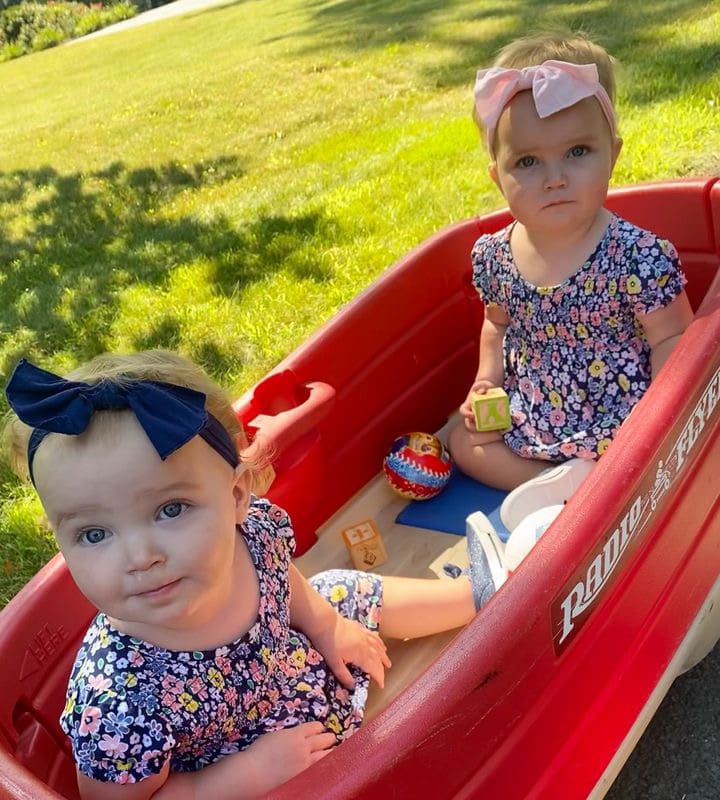
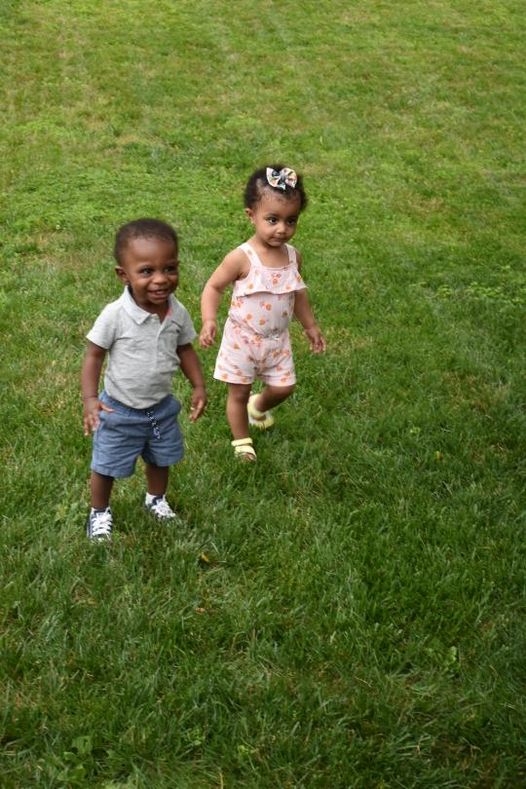
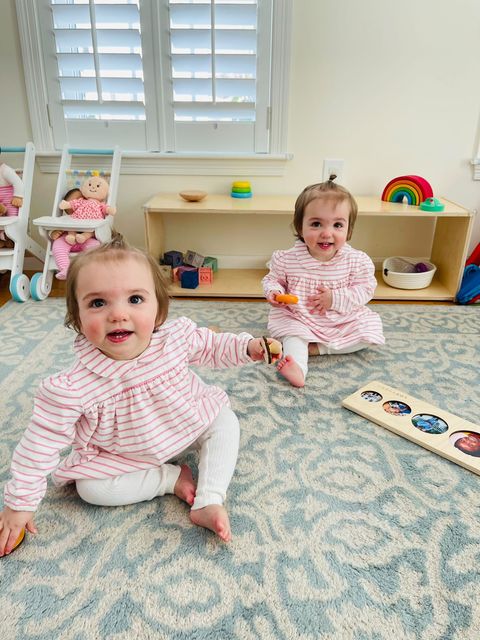
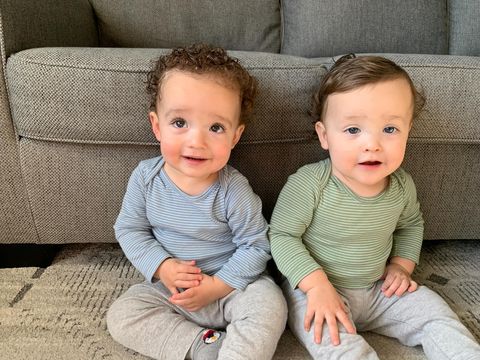

Sources
- Dr. Ilona Bendefy, Baby: Day by Day
- Dr. Frans X. Plooij and Dr. Hetty van de Rijt, The Wonder Weeks
- Marple, Kate, and Dawn Rosenberg. “When to Call 911: How to Tell If Your Baby Needs Emergency Care.” BabyCenter
- “Newborn Baby: When to Call the Doctor.” Cleveland Clinic
- “How Often and How Much Should Your Baby Eat?” HealthyChildren.org
- “13-Month-Old-Babys-Development” Whattoexpect.com
- “Baby’s Thirteenth Month: Milestones Checklist.” North Texas Medical Center

